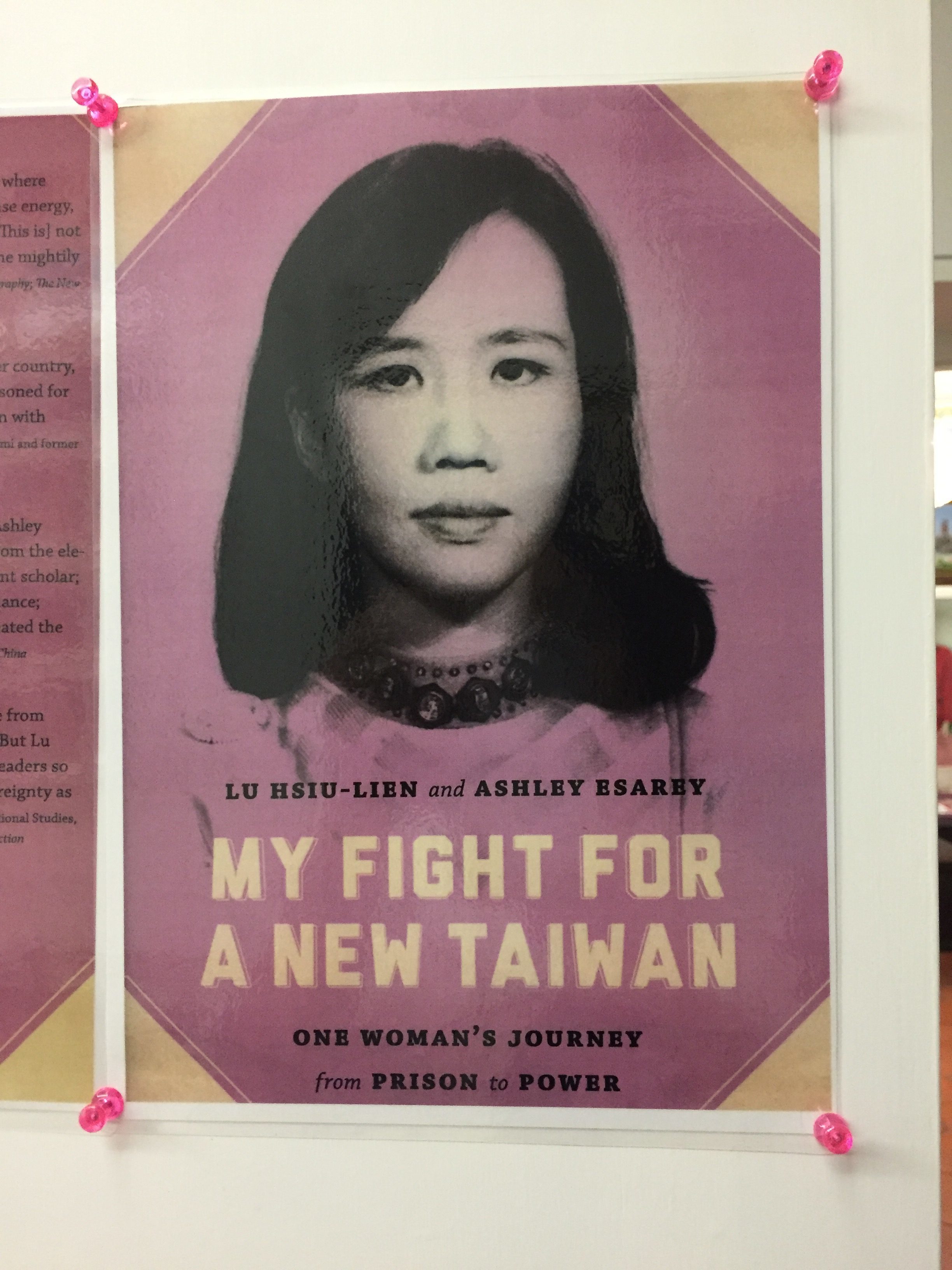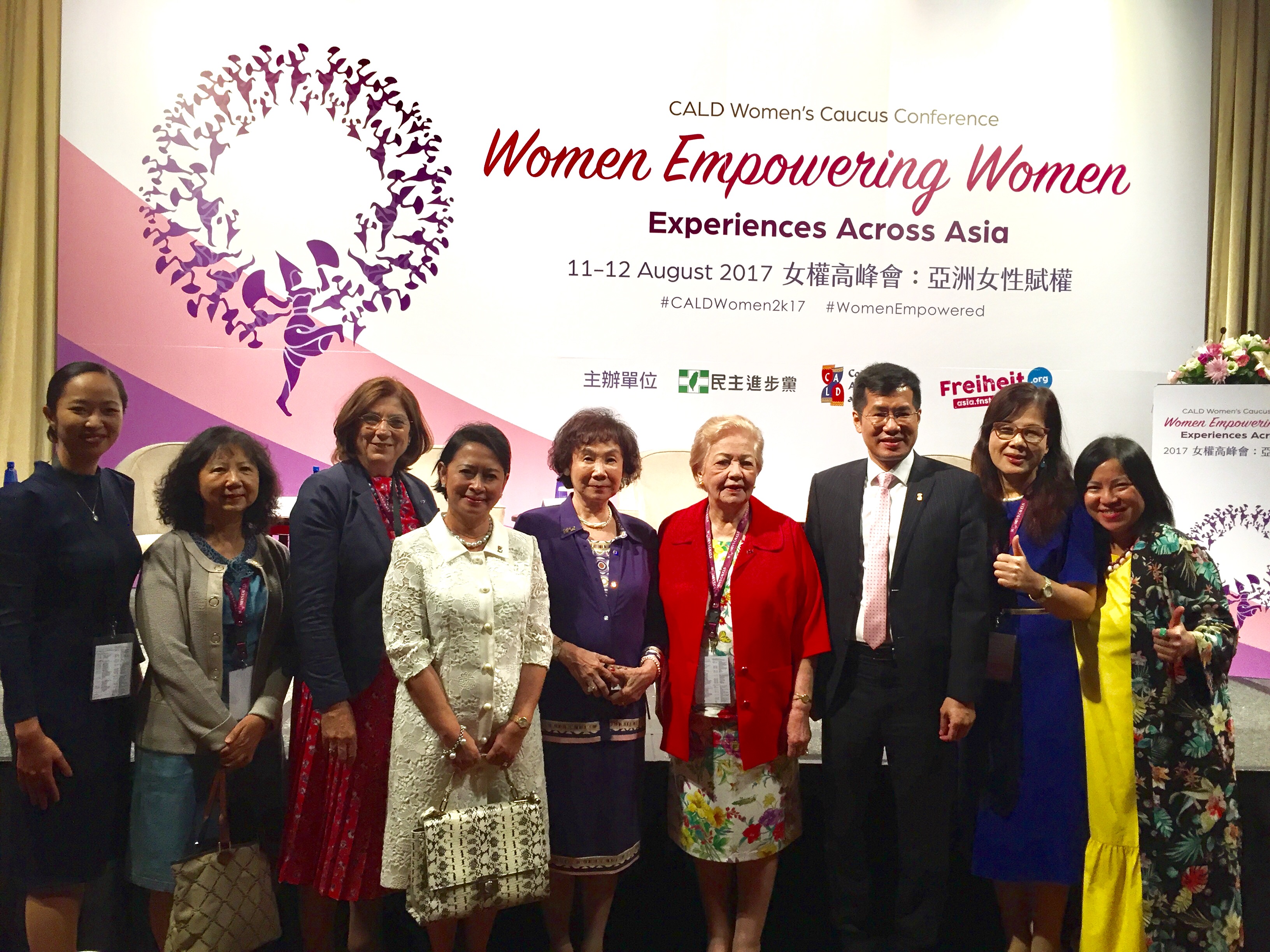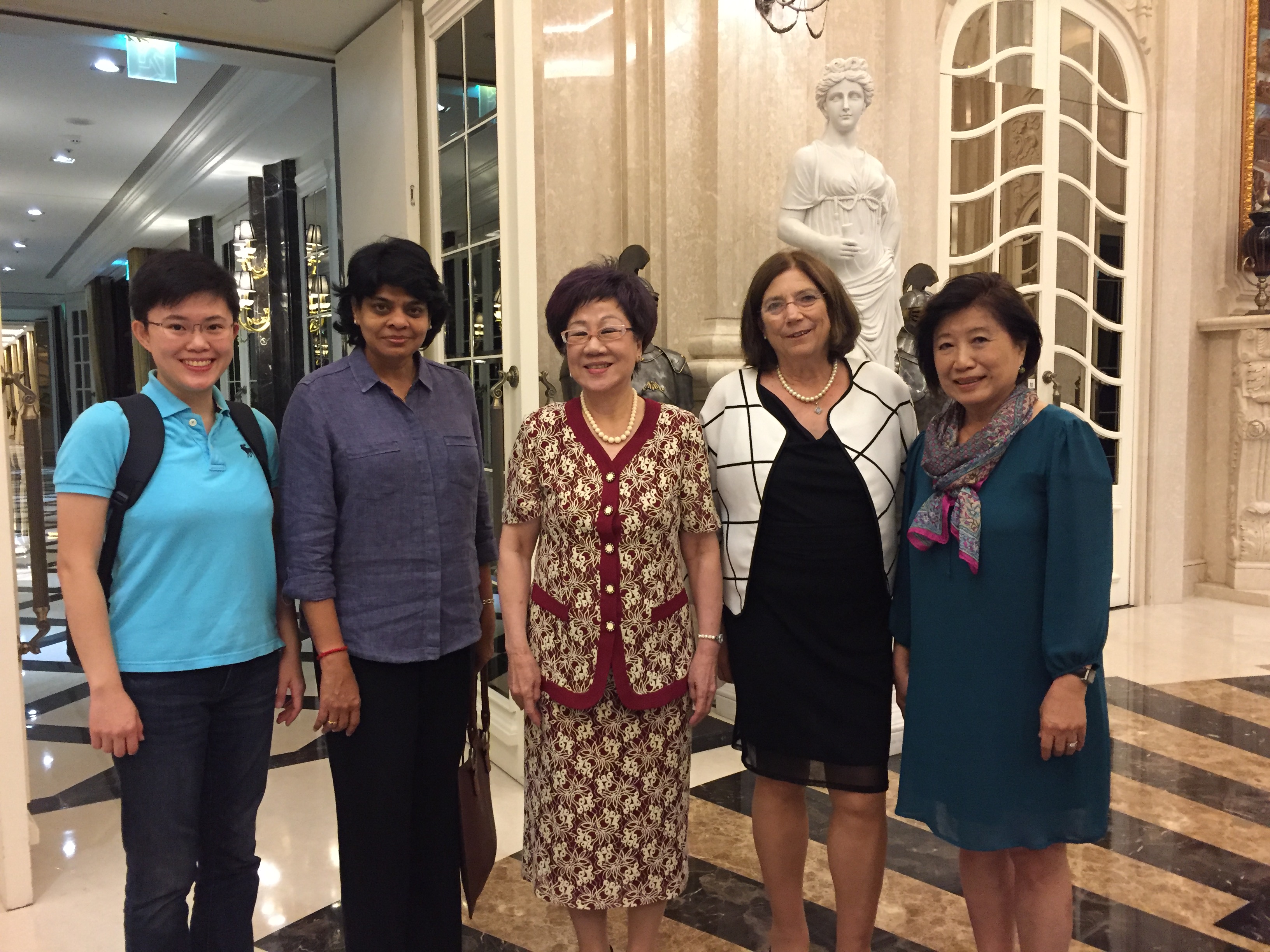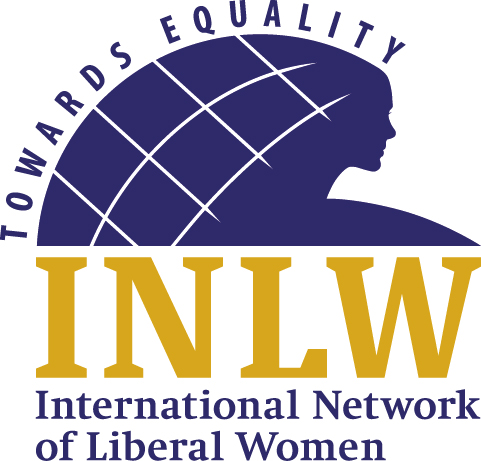Chairperson of CALD Women’s Caucus Ms Jayanthi Balaguru, Dr. Lo Chih-cheng, Madam Maysing Yang, and distinguished women leaders, members of diplomatic community, ladies and gentlemen,
Good morning and welcome to Taiwan!
It is a great pleasure for Taiwan to host the CALD Women’s Caucus Conference today, especially because Taiwan, for the first time ever, is led by a lady President Dr. Tsai Ing-wen. Since its inauguration in 1993, CALD has become a unique platform for dialogue and cooperation of liberal and democratic political parties in Asia. Thank you for your efforts to enhance democracy and development.
It is also my  pleasure to attend this significant conference to discuss the timely issues on women empowering women. As you may be aware of, I am the one who started to advocate feminism here in Taiwan 45 years ago.
pleasure to attend this significant conference to discuss the timely issues on women empowering women. As you may be aware of, I am the one who started to advocate feminism here in Taiwan 45 years ago.
Traditionally Taiwan’s women suffered from the double burden of Chinese Confucianism and Japanese male chauvinism. Under such culture, women were taught nothing else but to serve and to please men, making women the second sex.
In 1971, when I returned from my study in the United States, I found that the whole society was debating how to prevent young women from attending universities. It was argued that education for women is a waste, since women were expected to abandon their careers to take care of household after getting married. Under such an environment, I began to advocate feminism, criticizing male chauvinism and proposing new feminist doctrines. I wrote articles, made speeches, organized women and conducted a variety of activities.
Since 1949 till 1987, Taiwan had been ruled by Martial Law for 38 years under which not only was democracy suspended and civil society restricted, but serious human rights abuses frequently occurred. For six years I advocated feminism on the one hand and promoted human rights and democracy on the other, until being jailed on charge of sedition. One can imagine how tough and risky to launch such an anti-establishment campaign.
It was on December 10th, 1979, that the opposition held the International Human Rights Day rally in the city of Kaohsiung. Policemen and soldiers were ordered to release tear gas into the crowd, and gangsters were organized to attack the police in an attempt to implicate opposition leaders in the casualties caused.
I was so outraged that I stood on top of a truck and delivered a most provocative and touching speech for minutes. Tens of thousands of people in the audience were moved, some were even moved to tears. Three days later, I was the first one arrested followed by 151 others.
Eight of us leaders were tried by court martial and sentenced to 12 years in prison. No one would have expected that 20 years later, one of the defense lawyers from the trial would invite one of the eight “seditious elements” to be his running mate, and together they overturned 50 years of authoritarian one-party rule and became the president and vice president from the native opposition party.
The victory made by Mr. Chen Shui-bian and me in 2000 represented Taiwan’s victory of democracy over one of the world’s notorious autocracies. More importantly, with my election as the first female vice president, Taiwan entered a new era of bi-gender politics. Four years later, I was re-elected to serve another term, the unprecedented two-term Vice President.
Why only His-stories?
Women constitute half of the world’s population, but why through the Millennia of human history are there only “his stories” and not “her stories”?
Remember that not until 1910 women were able to attend the women’s conference in Copenhagen across the nations for the first time ever in the human history.
Remember that according to the UNESCO 1980 report, women were paid one tenth of the salary earned by men and owned only one percent of the entire world’s property, despite that women worked twice harder than men.
Who made the decision on whether women could or could not leave their homes and their countries? Who made the rules and laws that women only deserved one tenth of the working salary and one percent of property?
It’s MEN! Women did not reach to the pinnacle position until the 1950s when Mongolia elected its first female president.
In the 1990s, there were 30 women elected to become presidents. Ever since then, many countries in different continents have elected women presidents and female Prime Ministers.
But in Asia, most women national leaders came from powerful political families. Some of them were political widows. They are not feminists and women’s issues are not their interest.
Women today globally
However, the time is up for women to write “her-stories.” In 1995, only 12 women led their own countries, but as of today, there are 25. Worldwide, women occupy 18% in cabinet and 23% in national parliaments. In the private sector, women occupy 20.2% in the Fortune 500 board members and there are 27 female CEOs. Although progress has been made, it is still a long way before gender equality to be assured.
Politically, despite that there are 25 female state leaders in the world today, only 7.4% of the countries has female state leaders in the past 50 years. Female ministers in the cabinet usually are in charge of social issues, health, or education. In terms of party politics, few women become majority party leaders. The 1995 Beijing Declaration and Platform for Action issued at the fourth World Conference on Women called for 30% of national legislative seats worldwide, but parliaments in 37 countries had fewer than 10% female lawmakers. Women’s equal participation in decision making is not just a question of justice or democracy, but is a necessary precondition to make sure women’s interests are taken into account.
Economically, as of 2014, females make up only 14.6% percent of executive officers and 4.6% of Fortune 500 CEOs. In the same year, nearly 60% of 22,000 global firms had no female board members. The glass ceiling in the business sector is still hard to break. Equal pay in workplace is still a problem. In most countries, female labors are paid just 60%~75% of what men are paid. In a survey of 173 countries, 155 of them enforce laws that discriminate against women in workplace. 18 countries even allow husbands to prohibit their wives from working.
Violence against women
Another issue to address is violence against women (VAW). The UN Declaration on the Elimination of Violence Against Women states that: “violence against women is a manifestation of historically unequal power relations between men and women.”
Violence against women includes violence carried out by the “individuals” as well as by the “states”. One out of three women have been treated violently, and the perpetrators are usually people they know. 38% of the women murdered are killed by their partners. State-perpetrated violence includes war rape, sexual violence and sexual slavery during conflict, forced sterilization, and forced abortion. Moreover, trafficking in women and forced prostitution are often perpetrated by organized criminal networks. Violence is criminal in human society and violence against women is a universal issue that must be dealt with seriously in the She-Century.
She-Century
The time is up for the feminization of power. Imagine that politics is involved with half or more women, and that economic and social development with a half or more women’s participation. What differences, for better or worse, it would become? May we deem the 21st century as the beginning of the “She Century” and begin to discuss the issues of She-Politics, She-Economy and She-Society?
Imagine what the world would become when the Secretary-General of the UN and the President of the U.S. be women! Although that did not happen last year, this day will come eventually.
The most powerful leader in Europe is Madame Angela Merkel, and arguably she is also the leader of the FREE world, not Donald Trump!
The world currently has over 20 outstanding women national leaders. It’s the beginning of she-politics.
Besides, the 21st century is a century for she-economy! In fact, according to a 2014 report from email marketing solutions provider SimpleRelevance, women made 85% of consumer choices. It is expected that in the next decade, about 870 million women around the world will enter the job market. They will create works and start businesses and the gender gap in earnings will be narrowed down. Mobile and Internet technologies will help women run businesses easier. The fact is clear that, the more women in working force, the greater economic benefit is made.
Indeed, the era for she-economy has come! With good income women will become good consumers. More products are designed and marketed specifically for women, or suiting women’s taste. Businesswomen certainly know better than men for what women really like and need. And in many emerging economies women are now starting business at a faster rate than men, making significant contributions to job creation and economy growth. According to the IMF, if men and women get fair job opportunities, the GDP will grow by 5% in the U.S., 9% in Japan, and 34% in Egypt. More and more women have become active and powerful in the society as well as in politics and economy. People are inclined to trust women more than men in many democracies, making women easier to be elected into public services. In Taiwan for example, last year not only have we the first lady president, we also have 38% of MPs who are female.
Last year, all the parties nominated one man and one woman to be candidates for president and vice presidents. Besides, both two major parties have Chairwomen instead of Chairmen. It certainly is the big milestone for the feminist movement which I have launched for over four decades.
However, can feminization of power prevail the traditional problems left by male politicians and
entrepreneurs? Can women handle the crisis of war and terrorism, poverty and natural disasters better than men? How can women be trained to become good and even great leaders? The 21st century has become a new era as “She-Century”. It’s time for Asian women leaders to get together and discuss together on timely serious matters.
Tensions in East Asia
Since this year, East Asia has become an imminent new arsenal. North Korea’s rapid nuclear expansion not only threatens the region, but also the U.S. The new leadership in the Philippines and South Korea has caused subtle changes in their alliance with the U.S. In addition, Japan intends to amend its pacifist Constitution for restoring armed forces, and China has been devoting its ambition of territorial expansion claims and military deployment in both East and South China Seas, especially its ambition to annex Taiwan.
The 21st century is the century of the champion for the world leadership between China and the U.S. America the leading maritime country and China the rising mainland country encounter in East Asia, which is surrounded by five seas. Among the interlinkage of the five seas, Taiwan is involved in three of them and has sovereign and strategic interests. Taiwan is also located at the center of the first island chain. With its economic, technological, and political achievements, Taiwan’s strategic significance is undeniable and irreplaceable. Currently I am conducting a campaign to install peace Taiwan to become a neutral state would help pacify the region, and to develop the maritime areas to become demilitarized would help stabilize and prosper the region. How can the situation be pacified and how can the stability and security of the region be restored? More importantly, how can peace and prosperity among all the countries surrounding East Asia be maintained and enhanced? Time is up for women leaders in Asia to face ‘War or Peace’ seriously!
Women as Peace-makers
We have all seen movies and television series in which men are depicted as heroes, fighting each other for whatsoever reason, often with brutality, bloodshed and large number of casualties. Are men truly brave? Courage without wisdom and mercy is stupid and cowardly. Why are women always silent about what they feel and believe, good or bad, right or wrong? Peace has always been a dream for everyone, men and women as well. At the dawn of the Millennia, the whole world was celebrating and blessing for peace. Ironically, the tragedy of September 11, 2011 destroyed everybody’s dream and began to bring the nightmare of terrorism and armed conflicts, including nuclear explosions everywhere on earth.

Looking over the entire human civilization, 99.9% of wars were initiated by men, yet 100% of victims were women and their beloved husbands and children. Did men ever ask women whether they like wars? Did women ever have the power to prevent the wars from happening?
Indeed, women have been historically left out of peace processes. Not until 2000, the UN Security Council
adopted Resolution 1325 to link women to the peace and security agenda for the first time ever. It calls for women’s active participation at all levels of decision-making on conflict prevention, conflict resolution, peace processes, and peacebuilding.
Since 2000, five resolutions on women, peace, and security have been adopted by the UN Security Council to strengthen women’s participation in decision-making, conflict prevention and resolution. These resolutions represent a critical framework for improving the situations of women in conflict-affected countries. They have formed the basis of many national policies and action plans in conflict-affected settings.
From 1992 to 2011, there were 31 major international peace treaties signed. Among them 9% were negotiated by women, and 4% were signed by women. When women are involved, the chances of a peace treaty to last over 2 years increase by 20%, and 15 years by 35%. Women are true peacemakers!
Women as environmentalists
Furthermore, women can also be the best environmentalists. How so?
The 21st century is praised to be the century of Asia with the development and prosperity here. But according to UN’s report, 70% of the world’s major natural disasters have occurred in the Asia Pacific region, and opportunities of this region suffering from natural impact are 4 times more than Africa, and 25 times more than America and Europe!
Indeed, our mother earth and human beings are facing more threats than we normally think. All these natural catastrophes are caused or deteriorated by Ozone layer depletion, magnetic anomaly, and solar storms, other than global warming. We humankind always boast that we are the smartest animals on earth. But don’t forget that humankind cannot survive without the earth and yet the earth can survive without humankind. In fact, according to biologists, ants are more important than humankind for the existence of
the earth. Ants penetrate soil and help soil ventilate. They also help spread pollen of plants. Humankind cultivates the land but they also exploit and destroy the great nature. Unless we learn to refrain from over-consumption and to cherish things on earth, the earth will become disastrous. Only when green lifestyle becomes a fashion, the earth can be survived. We women are the best housekeepers for the house, and also for the earth. Women, as the nurturers of life and as half of the population on earth, shall launch a green renovation for green civilization. The concept of green civilization stresses the following four interests of balance:
- The value of life.
- The standard of livelihood.
- The quality of environment.
- The benefit of industrial investment.
I firmly believe that there is no justification to pursue industrial benefit at the cost of people’s lives or living standard or the environment. Without life, nothing is left; without earth, no life can exist. Life prevails over everything and anything! Remember that there is only one earth and humankind is one family.
Soft power as a way to change the world
Throughout human history, problems after problems threaten the survival of the universe and living beings, no matter ecological or economic, political or social. In recent years the global economy has been hit by financial tsunamis, and the human society has been harassed by terrorism.

To face the unprecedented, multiple challenges coming our way, women have to learn and apply the wisdom of “soft power”. My country Taiwan has learned to project soft power, namely, democracy, human rights, culture, love, peace and technological innovation. These values help and facilitate Taiwan’s transformation from a small, poor country under an authoritarian regime into a highly developed country with most advanced high-technology and democracy. While the traditional “hard power” is destructive and exploitative, soft power is constructive and generous in nature. Soft power is the foundation for world peace and substantial development. The struggle for hard power is often a zero-or even negative-sum game (as in the case of wars), while the nature of soft power is always a positive-sum game. Hard power should no longer be the sole measurement of a country’s success, and soft power shall play more important role in the future of our world.
What are female characteristics in she-century?
Compared to men, businesswomen tend to start business from humanitarian perspective, caring more about environmental protection and ecology, and sense of beauty. More women empowered means more humanity, more green economy, and more artistic interests. In a word, women tend to be the pivotal power for the substantial development of the globe. While he politics and he-economy pursuits for self-interest, expansion and exploitation, she-century reflects a value of humanity, greenness, and benevolence. While he-century stresses on “hard power,” she-century elaborates “soft power.” The 58th session of the UN Commission on the Status of Women stressed gender-specific targets across other development goals, strategies and objectives – especially those related to education, health, economic justice and
the environment. Therefore, the women leadership in the 21st century has to put the priority of gender-specific target along with she-century into her agenda. I firmly believe that with Feminism and soft power, women’s leadership can change the world better. Women shall be determined to lead their family, their society and their world for a better future. Women shall make mission impossible into mission possible. Above all, women shall write her-stories into human history!

 Visit our Facebook page
Visit our Facebook page